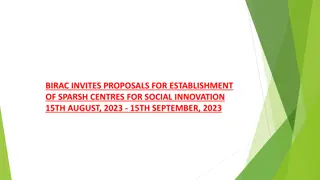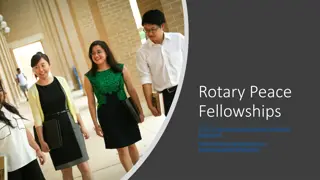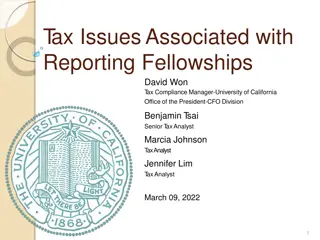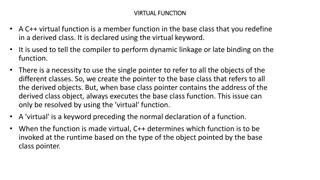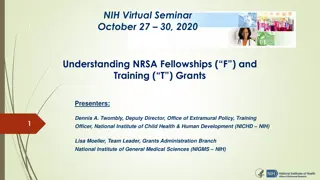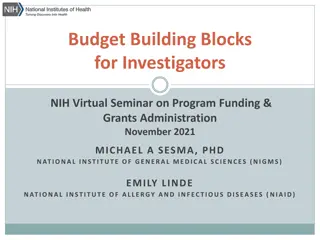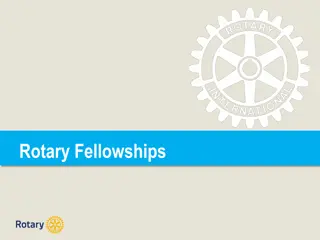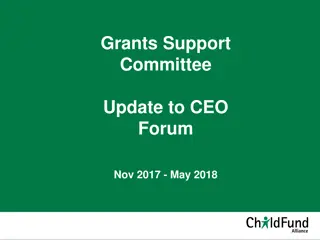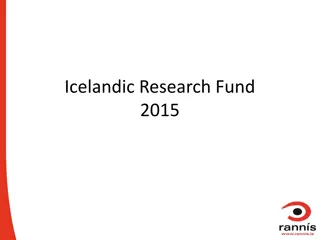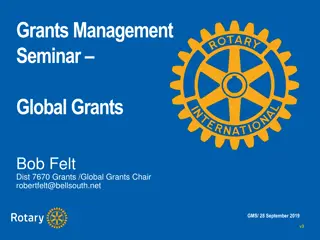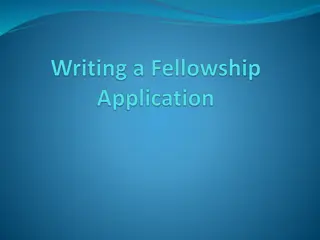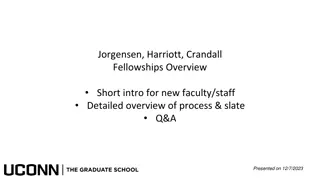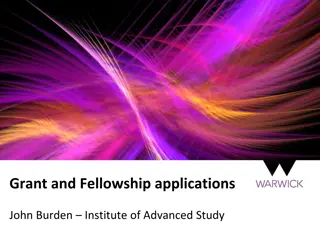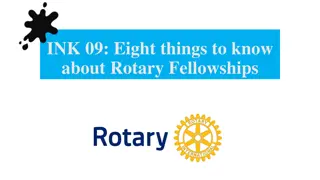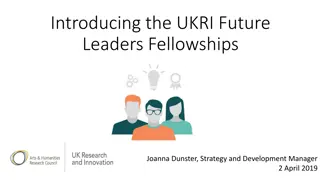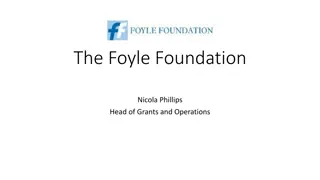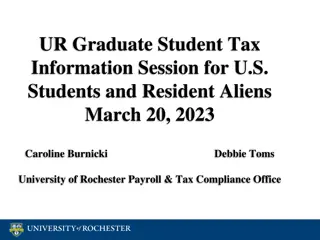Understanding NRSA Fellowships and Training Grants Virtual Seminar Overview
This virtual seminar provides an in-depth overview of NRSA Fellowships (F awards) and Training Grants (T awards) offered by NIH. The session covers eligibility, application processes, post-award management, and the program's purpose of supporting the training of biomedical, behavioral, and clinical researchers. Additionally, it highlights the different types of awards available, including individual fellowships and institutional training grants.
Download Presentation

Please find below an Image/Link to download the presentation.
The content on the website is provided AS IS for your information and personal use only. It may not be sold, licensed, or shared on other websites without obtaining consent from the author. Download presentation by click this link. If you encounter any issues during the download, it is possible that the publisher has removed the file from their server.
E N D
Presentation Transcript
Understanding NRSA Fellowships (F) and Training ( T ) Grants NIH Virtual Seminar November 1-4, 2021 1 Presenters: Dennis A. Twombly, Deputy Director, Office of Extramural Policy, Training Officer, National Institute of Child Health & Human Development (NICHD NIH) Lisa Moeller, Team Leader, Grants Administration Branch National Institute of General Medical Sciences (NIGMS NIH)
Session Overview 2 Objective of Session: Provide an overview of Individual NRSA Fellowships (F awards) and Institutional Training Grants (T awards), including the purpose of the programs, eligibility, application process, and post-award management. Format of Presentation: NRSA Programs: Eligibility and general requirements Individual Fellowships (F): Programs and Applications Institutional Training Grants (T32): Programs and Applications Post-award Issues: Individual Fellowships Post-award Issues: Institutional Training Grants
What and Why? 3 What are they? NRSA awards support the training of biomedical, behavioral, and clinical researchers through individual pre- and postdoctoral fellowships, and institutional research training grants. Program purpose? Ensuring that a diverse pool of highly trained scientists is available in adequate numbers and in appropriate research areas to carry out the Nation s biomedical, behavioral, and clinical research agenda.
27 NIH Institutes and Centers (ICs) 4 Each with different: Mission & priorities Budget Funding strategy Workforce needs NIGMS logo Collection of logos from each NIH IC CC logo NLM logo NIGMS See full size image Clinical Center International Center NIAMS logo See full size image Home
5 Research Training and Career Development Fellowships & Career Awards T32 Institutional Training Grants (Predoctoral slots) F30 Pre-doctoral Fellowships (MD/PhD Programs) F31 Pre-doctoral Fellowships (Parent F31) F31 Diversity Pre-doctoral Fellowships GRADUATE & MEDICAL STUDENTS Training T32 Institutional Training Grant (Post-doctoral slots) F32 Individual Post-doctoral Fellowships POST- DOCTORAL FELLOWS Transition Research Grants K22 Career Transition Award (some ICs) K99-R00 Pathway to Independence Award R03 Small Grant K12 Institutional Career Development Award R21 Exploratory- Developmental Grant K01 Mentored Research Scientist Development Award K08 Mentored Clinical Scientist Development Award K23 Mentored Patient-Oriented K Award K25 Mentored Quantitative K Award Independent FACULTY R01 Research Project Grant K02 Independent Scientist Award K24 Mid-career Award in Patient-Oriented Research
NRSA Fellowships & Training Grants 6 Individual Predoctoral Fellowships (F30, F31) Individual Postdoctoral Fellowships (F32) http://t0.gstatic.com/images?q=tbn:ANd9GcR-0MRZ1nnuxKirPGKvsgHzo_HHB4Zx8QuSlYxmOedDUzOI4TsmCFtp4cUi Institutional Training Grants (e.g., T32, T35) Awarded to the institution Supports group of pre- and/or postdoctoral fellows on slots Administered under direction of PD/PI or Training Director http://t0.gstatic.com/images?q=tbn:ANd9GcTvH3HFuthtbgWxwyQ-WIEFHv1xrEm-YjhrgRHiPUmWxPFv-1BkRW5KOg
NRSA Programs Eligibility and Requirements 7 Citizenship: NRSA fellows and trainees must be U.S. Citizens, non-citizen nationals, or lawfully admitted for permanent residence at time of award (F) or time of appointment (T) Degree Requirements: Predoctoral: Must have a baccalaureate degree and be enrolled in doctoral program leading to PhD or equivalent, or dual research/clinical doctorate such as the MD/PhD Postdoctoral: Must have a PhD or MD or comparable doctoral degree from an accredited domestic or foreign institution
NRSA Duration of Support 8 Predoc: 5 years (6 years for dual degree, eg MD/PhD) Postdoc: 3 Years Aggregate limits apply: any combination from individual and/or institutional awards Exceptions: Interruptions (break in service) Waiver request requires IC prior approval Exceptions are Rare
Time Commitment of NRSA Fellows/Trainees 9 Full-time Training: NRSA fellows are required to pursue full-time training, as defined by 40 hrs/week devoted to research training activities. Part-time Training: Less than full-time training may be approved under certain conditions. Allowed in unusual personal circumstances (e.g., medical conditions, disability, personal or family situations such as child or elder care) Part-time training is not allowable to accommodate other sources of funding, job opportunities, or clinical practice or training NIH prior approval required: Program Director or Sponsor must submit written request, countersigned by fellow & authorized institutional official Fellow/trainee must continue to devote at least 50% effort. Less than 50% would require unpaid leave-of-absence from NRSA support.
NRSA Trainee Support includes 10 Stipend Subsistence allowance to help defray living expenses Tuition & Fees Full needs should be requested; NIH allowance is 60% of costs up to $16,000 (predoc), $21,000 (dual degree predoc) and $4,500 (postdoc) Training-related expenses Health insurance, staff, consultants, research supplies F&A 8% on base (excludes Tuition & Fees and Equipment) Google Search: NRSA Stipends 2022 to get current rates for stipends and other cost categories
11 Individual NRSA Fellowships Programs and Applications
Individual Fellowship Types 12 Predoctoral Fellowships: F30: Individual Predoctoral Fellowship for Institutions with MSTP funding for MD/PhD or other formal dual degree programs F30: Individual Predoctoral Fellowship for Institutions without MSTP funding for MD/PhD or other formal dual degree programs F31: Individual Predoctoral Fellowship (most under Parent FOA) F31 (diversity): Individual Predoctoral Fellowship to promote diversity in Health- Related Research Postdoctoral Fellowships: F32: Postdoctoral Fellowship F33: Postdoctoral Senior Fellowship (independent investigators with > 7 yrs of experience; for re-training, sabbatical, career development) check IC tables!
Refer to Program Announcements (PAs) !! Funding Opportunity Title Ruth L. Kirschstein National Research Service Award (NRSA) Individual Postdoctoral Fellowship (Parent F32) Funding Opportunity Announcement (FOA) Number PA-20-242 Components of Participating Organizations (all NIH ICs, e.g.) National Center for Complementary and Integrative Health (NCCIH) National Cancer Institute (NCI) National Eye Institute (NEI) National Human Genome Research Institute (NHGRI) National Heart, Lung and Blood Institute (NHLBI) National Institute on Aging (NIA) Special Note: Not all NIH Institutes and Centers participate in Parent Announcements. Applicants should carefully note which ICs participate in this announcement and view their respective areas of research interest and requirements at Table of IC-Specific Information, Requirements and Staff Contacts website. ICs that do not participate in this announcement will not consider applications for funding. Consultation with NIH staff before submitting an application is strongly encouraged.
How to apply for a K award 15 Follow SF424 instructions for F awards
Fellowship Review and Award 16 Two-stage review: 1. Initial Review Group (CSR Fellowship Study Sections or IC- based study sections; Google search: CSR fellowship study sections); some ICs review F applications in-house 2. Second-level review: Institute/Center Program Staff - (analogous to Council) Generally 9-month period from receipt to earliest possible award (except October Council)
Review Criteria for Fs Refer to FOA for details! 17 Additional Review Criteria: Protection for Human Subjects Inclusion of Women, Minorities, and Children Vertebrate Animals Biohazards Resubmission & Renewal factors Scored Review Criteria: Fellowship Applicant Sponsor, Collaborators/ Consultants Research Training Plan Training Potential Institutional Environment and Commitment to Training Additional Review Considerations: Training in the Responsible Conduct of Research (RCR) Select Agents Research Resource Sharing Plans Budget & Period of Support
18 Institutional Training Grants Program Features and Applications
What are Institutional Training Grants ? 19 Institutional training grants (e.g., T32, T35) offer research training in thematically focused area(s), often multidisciplinary Programs are funded for specific number of pre- and/or postdoctoral slots Participating Mentors/Faculty provide research training Applicant Institutions must have: o Strong research program in the proposed area(s) o Competitive Applicant Pool Program Director(s) responsible for: o Overall direction of the training program o Selection and appointment of NRSA eligible trainees
20 Features of a T32 Program Intensive training in a research specialty with a mentor Choice of a spectrum of laboratories Exposure to different methods and technologies Courses & seminars with national experts Training in Responsible Conduct of Research (RCR) Human & animal subjects protections Communication skills (manuscripts, grants, oral presentations, public outreach) Alternative career paths (pharma, biotech, gov t, teaching Travel to other labs or scientific meetings
Preparing a T32 Application 21 Apply through Funding Opportunity Announcement (Parent or other FOA) Follow SF424 Application Guide Training (T) Instructions Eligible Institutions = Domestic, non-profit public or private institutions Research training must fall within the mission of the NIH awarding Institute or Center (confirm with NIH Program Staff or Training Officers!) Application Due Dates: Standard Dates (Jan 25, May 25, Sept 25), Except: See FOA or IC Tables linked to Parent FOA! Many ICs only use the May 25 due date each year Some ICs have different due dates for NEW vs RESUBMISSION Some ICs use different dates for AIDS vs non-AIDS applications Some ICs use different dates for predoctoral vs postdoctoral programs
22 Review of Training Grants Two Levels of Review: Initial Review - Study Section Some Institutes have single study section Some Institutes use multiple study sections organized by topic Institute or Center National Advisory Council
Review Criteria for T32 Applications 23 Scored review Criteria: Additional Review Criteria: Resubmissions (responsive to critiques?) Renewals (progress, including on the Recruitment Plan to Enhance Diversity, training in Responsible Conduct of Research, evaluation of program, proposed changes) Revision Training Program and Environment Training Program Director(s)/Principal Investigator(s) (PDs/PIs) Preceptors/Mentors Additional Review Considerations: Trainees Diversity Recruitment Plan Training in Responsible Conduct of Research Select Agent Research Budget and Period of Support Training record
25 Individual NRSA Fellowships Post-award Issues
26 NRSA Fellowships Initiation of Support Awarding component will notify individual of intention to make an award The fellowship Notice of Award will be issued Fellow must start training within six months of the award issue date Before the day Fellow begins training, Activation Notice and Payback Agreement (only for Postdoc fellows in first 12 months of NRSA support) must be completed and submitted to awarding component Termination Notice due at end of fellowship and submitted via xTRAIN
27 Reporting Requirements Activation Notice: (FORM PHS 416-5) Immediately upon initiation of training, fellow completes and returns this form to the NIH awarding component. Payback Agreement: (FORM PHS 6031): Must be signed by each person who is to receive an individual Postdoctoral fellowship that covers their initial 12 months of NRSA postdoc support. Termination Notice: (FORM PHS 416-7): For individual fellowships, this form is required upon completion of support. Electronic submission now required through eRA Commons xTrain.
28 Stipend Supplementation Fellows and Trainees Recipients may supplement stipends Amount determined according to formally established policies applied to all in similar training status Consistent treatment is key Supplementation must be from Non-Federal funds Without additional effort or obligation to trainee/fellow
Compensation 29 Trainees/Fellows may receive additional compensation for services associated with employment, e.g., teaching assistant, lab assistant Individual receives salary; not considered stipend supplementation Can compensation be from an NIH research grant? Yes, on a limited part-time basis (25% time = 10 hr/week) May not be from same grant that is part of training experience Fellowship Sponsor or Training Grant Program Director must approve May not interfere with or prolong the approved NRSA training
Progress Reports 30 Progress Reports: Progress reports must be submitted annually using the Research Performance Progress Report (RPPR) in the eRA Commons. Final Progress Report: For individual awards, a final progress report is required as part of the Termination Notice. A separate final progress report is not required. Federal Financial Report (FFR): A Financial Expenditure Report is not required for individual fellowship awards. However, institutions must complete the Federal cash transaction using the FFR to PMS (SF425).
Fellowships: Changes in Project 31 Individual fellowship awards are made for training at a specific institution under the guidance of a particular sponsor. A change of institution or sponsor requires the approval of the NIH awarding component. Consult with NIH awarding component ASAP. Any proposed change in the individual s area of research training must be approved by the awarding component. If the sponsor plans to be absent for more than 3 months, an interim sponsor must be named by the institution and approved by the NIH awarding IC.
Leave Policies: Fellows and Trainees 32 Vacations & Holidays: Predoc and Postdoc Fellows & Trainees may receive the same vacations and holidays available to individuals at the recipient or sponsoring institution. Trainees will continue to receive stipends. Sick Leave: May continue to receive stipends for up to 15 calendar days (2 weeks) of sick leave per year. Parental Leave: May receive stipends for up to 60 calendar days (8 weeks) of parental leave per year for the adoption or birth of a child. Unpaid Leave: Extended leave beyond above allowances must be requested in advance from awarding component. Fellowship: award will be revised extending termination date by the number of months of leave. Trainee (T32): terminate & reappoint Stipends may not be reimbursed during unpaid leave; continued health insurance coverage is allowable if consistent with institutional policy. See NIH Grants Policy Statement and NOT-OD-18-154
33 Institutional Training Grants (T) Post-Award Issues
xTRAIN Appointment and Termination Notices 34 xTRAIN: eRA Commons electronic submission of trainee appointments, reappointments, amendments, and Termination Notices REQUIRED Appointment Forms (PHS 2271) Due on or before the start of the appointment period No stipend or other allowance may be paid until submitted Delinquent submissions (> 30 days) may result in disallowance Termination Notices (PHS 416-7) Required at time an appointment is ending Reflects total period of support & NIH stipend only (do not include any supplementation) If there was a hiatus of support, report only current period
Trainee Appointments 35 Trainees considered full-time participants in training program (40 hrs/wk) Most appointments are 12 months in duration Appointments less than 9 months not allowed unless completing a planned training program Appointments may begin any time during the budget period
Appointments 42 Training slots vs. Training months Varies according to IC 3 FTTPs = 36 training months (3 x 12) Look for footnote under terms and conditions or contact awarding IC Example: This award includes funds to support X trainees (xx Training Months). The maximum number of trainees that may be appointed without the prior written approval of NIGMS staff is X ( xx Training Months) if funds are available through rebudgeting.
Overlapping Appointment 37 An appointment period may overlap budget periods Budget Year 1 (FY18) 5/1/2018 4/30/2019 Budget Year 2 (FY19) 5/1/2019 4/30/2020 Trainee 1 Appointment 8/1/2018 7/31/2019 Trainee costs expensed from year of appointment. Overlapping Stipend & Tuition (3 months) reported as unliquidated obligation on FFR. NOT carryover.
Training Grants: Allowable and Unallowable Costs 38 Allowable Stipends Trainee Tuition and Fees Trainee Related Expenses o Health Insurance (self or family) o Medical liability and other special insurance (if required by the research) o Staff Salaries o Speaker Fees Trainee Travel Facilities and Administrative Costs (8%) Unallowable Pre-Award Costs Trainee costs*- must be appointed Stipends * mid-appointment changes Trainee Travel travel costs outside of the trainee appointment period
Research Performance Progress Reports (RPPR) 39 Annual RPPR Use to describe a grant s scientific progress, identify significant changes, report on personnel, and describe plans for the subsequent budget period or year. [Due Date varies by IC] Interim RPPR Use when submitting a renewal (Type 2) application. If the Type 2 is not funded, the Interim RPPR will serve as the Final RPPR for the project. If the Type 2 is funded, the Interim RPPR will serve as the annual RPPR for the final year of the previous competitive segment. [Due 120 days after period of performance end date of competitive segment.] Final RPPR Use as part of the grant closeout process to submit project outcomes in addition to the information submitted on the annual RPPR. [Due 120 days after period of performance end date.]
Financial Reporting Requirements 40 Use the Federal Financial Report [FFR] Quarterly Cash Report in the Payment Management System Expenditure reporting of FFR required annually to NIH through eRA Commons Required annually 90 days after end of calendar quarter in which budget period ends Example: Budget period ends 6/30; Expenditure report of FFR due 9/30 Unliquidated obligations can be used to report any stipends and tuition charges for overlapping appointments Automatic Carryover of an unobligated balance for training grants is not generally allowed but awards are footnoted either way
41 Prior Approval Requests Change of PD/PI Rebudgeting from restricted categories Replacement of early termed trainee* Predoc/Postdoc substitution Trainee leave of absence NRSA limit waiver (5yr pre/3yr post)
Rebudgeting 42 Restricted Categories: Stipend, Tuition/Fees Rebudgeting allowed into and between these categories Not allowed into unrestricted categories w/o prior NIH approval (strong justification required) Unrestricted Categories: Trainee Travel, Training- related Expenses (TRE) Rebudgeting allowed into any other category w/o prior NIH approval
No-cost Extensions 43 No prior approval required for first 12 months Terms of award for final year: This award represents the final year of the competitive segment for this grant. If the grantee exercises its authority to extend this grant at the end of the project period, the grantee institution may not appoint any new trainee to the grant during the extension period without the written prior approval of NIH. A reappointment of a trainee is allowable during the extension period if funds are available; however, the stipend level must be consistent with the levels established for the fiscal year in which this award is made.
Training Resources 44 NIH Research Training Website: https://researchtraining.nih.gov/ T Kiosk (FOAs): http://grants.nih.gov/training/T_Table.htm F Kiosk (FOAs): http://grants.nih.gov/training/F_files_nrsa.htm How to Apply - Application Guide (includes Training and Fellowship application form instructions): http://grants.nih.gov/grants/funding/424/index.htm RPPR Information (including Instruction Guide): http://grants.nih.gov/grants/rppr/index.htm
Grants Information: Contacts 45 General Application Questions: E-Mail: GrantsInfo@nih.gov Phone: 301-945-7573 Grants.gov Customer Support: E-Mail: support@grants.gov Webpage: http://grants.gov/ Phone: 1-800-518-4726 eRA Service Desk (formerly eRA Commons Helpdesk): Web: https://grants.nih.gov/support/index.html Toll-free: 1-866-504-9552 Phone: 301-402-7469 Hours: Mon-Fri, 7a.m. to 8 p.m. Eastern Time
Grants Policy Contacts 46 Division of Grants Policy: E-Mail: GrantsPolicy@mail.nih.gov Phone: 301-435-0949 Division of Grants Compliance & Oversight: E-Mail: GrantsCompliance@mail.nih.gov Phone: 301-435-0949 Division of Extramural Inventions and Technology Resources: E-Mail: Inventions@nih.gov Phone: 301-435-1986
Resources for Applicants NIH Program Announcements (PAs, RFAs) Purpose, eligibility, allowable costs, review criteria Tables of IC-specific Information, Requirements, & Staff Contacts www.nih.gov (follow links to training or peer review ) Office of Extramural Research ( OER grant programs, forms) Center for Scientific Review: www.csr.nih.gov (review process) Institute web sites: www.nichd.nih.gov (program interests) Mentor (current and/or proposed) Department Chair or Administrator University/School Sponsored Programs Office Other colleagues & faculty NIH Program Staff (before applying and after review) !!
Contacts Dennis A. Twombly Training Officer, NICHD-NIH Email: dtwombly@mail.nih.gov Lisa Moeller Team Leader, Grants Administration Branch, NIGMS-NIH Email: moellerl@mail.nih.gov For other Questions about this presentation, go to: NICHD or NIGMS Booth Ask a Training Officer Booth


